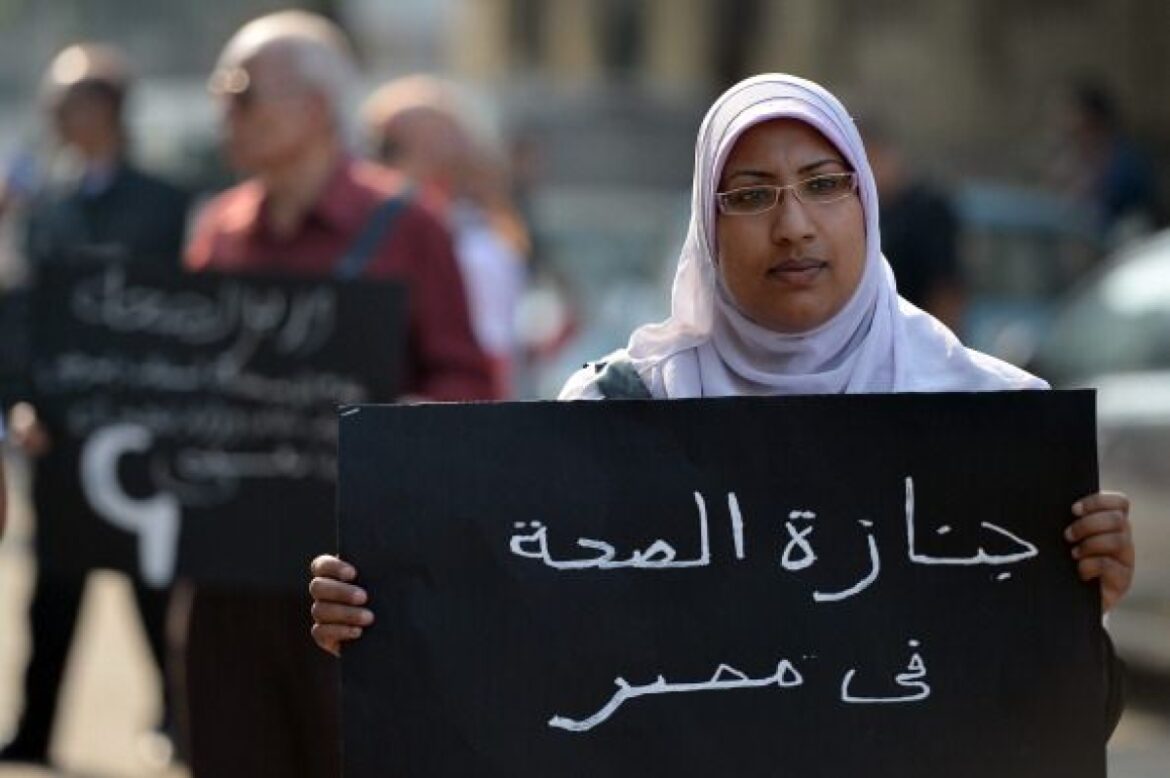CAIRO, Egypt -Nearly two weeks ago I ran into a throng of doctors gathered outside a Cairo courthouse. Members of the non-partisan group Doctors Without Rights and the Doctors Syndicate, as well as independent medics, were protesting against the Syndicate’s general assembly’s decision to indefinitely postpone elections for membership to the Syndicate board. Half of the Syndicate’s board is required to renew its membership every two years. The elections should have been held on October 11, the board’s current membership expired this week on October 14.
“Will justice save the health of Egypt?” read one of the banners they brandished. “We don’t want politics in our syndicate,” was emblazoned on another, and “Muslim Brothers have made a deal with the corrupt in the Health Ministry.”
Pediatrician and Syndicate member Ahmed Bakry believes the Syndicate’s move to call off elections implies that the Muslim Brotherhood-dominated Syndicate is well aware of the likelihood that the Brothers would lose its majority. The Syndicate is currently composed of twenty-four members, eighteen of them connected to the Muslim Brotherhood, four from Doctors Without Rights, and two independents.
According to Dr. Amr Shura, a candidate in the postponed elections, the Brotherhood—excluded from political life for a long time—found in the trade unions a back door to fight their political battles. He argues that the Muslim Brothers have almost paralyzed the Doctors Syndicate today. This, he says, is reminiscent of the Mubarak years when the Muslim Brotherhood succeeded in freezing elections within the Syndicate for almost twenty years.
Dr. Shura condemned the general assembly’s decision, arguing that the assembly has no right to bypass the law. He voiced concern that the Syndicate board would function “illegally” after its membership’s expiry, and said he feared that the board could make decisions with half of its members missing.
This latest demonstration allows a small glimpse into the general disarray found in Egypt’s healthcare system. Standards within the health sector in Egypt have been dropping for decades now, reaching back as far as Anwar Sadat’s presidency in the 1970s. Some argue that the root of many of today’s problems date back to Sadat’s dismantling of the state-controlled economy shaped by his predecessor Gamal Abdel Nasser. Sadat’s changes included the privatization of healthcare.
Privatization of healthcare has driven the state away from its obligation to be a major provider of health services. Instead the burden of medical expenses has been squarely placed on the shoulders of patients. Only those who can afford it are treated, which is not a large part of the total population. An estimated quarter of Egypt’s population lives below the poverty line according to government statistics, with another quarter living precariously close to it.
Bakry called the government’s neo-liberal policies toward healthcare “criminal,” maintaining that the ongoing trend has deprived many citizens of any real healthcare. Ophthalmologist Emtiaz Hassoona, a member of Doctors Without Rights, has been standing up against the government over its attitude toward healthcare for years. Shocked by the early effects of privatization, she has since been engaged in a continual battle with the hospital administration at her workplace.
In the last two years, Hassoona has traveled throughout Egypt with her camera, documenting the conditions of healthcare services around the country. She comments on a picture she took in Montaza district in Alexandria, it shows a doctor crossing a street full of sewage while two children try to make their way to school. “In Montaza, 25 doctors are expected to serve 550 schools. Each school has about 7,000 pupils. Is this sane?” she exclaims.
Salaries in the public sector are extremely low, pushing the majority of doctors to work in private hospitals or clinics. Dr. Shura cited a recent survey stating that approximately seventy percent of Egyptian doctors work three jobs.
To add insult to injury—quite literally—attacks inside hospitals have been on the rise since the 2011 revolution, both against medical staff and between patients from opposing political fronts. Hassoona, who volunteered in field hospitals during the January 25 revolution, recalled one of the pamphlets they carried with them saying: “Why put a tank in front of the stadium, and not in front of a hospital?”
Shura has similar stories. Last October two doctors at Al-Mounir hospital were attacked after they refused to let the police arrest a protester who was in need of first aid. “When you’re working in a hospital, you have to abide by a code of ethics,” he stated. Shura has also witnessed several attacks against doctors on hospital wards from family members of patients who are dissatisfied with the treatment provided.
The Doctors Syndicate has made little progress toward fixing these problems, and this is unlikely to change without bringing in new faces. Hassoona believes the Brotherhood has “kidnapped” the Syndicate for political gain. She said the group have been controlling the board since Mubarak’s tenure, never acting for doctors’ rights, and providing no indication that it intends to improve public healthcare services. In her view, the group made an “undeclared treaty” with Mubarak to maintain the status quo.
Hassoona believes that even today the military and the Muslim Brothers have an “under the table” agreement to make sure the healthcare system remains privatized. Bakry shared similar thoughts, adding that the shortage in public money for healthcare benefits the Muslim Brotherhood, as they use their charity work network to attract popular support.
Doctors are now calling on the government to meet three key demands: higher wages for health professionals and better work conditions; an increase in the Health Ministry’s budget allocation (to bring health spending from 4.7% to 15% of the state budget); and security of hospitals and medical facilities.
Originally published in The Majalla

